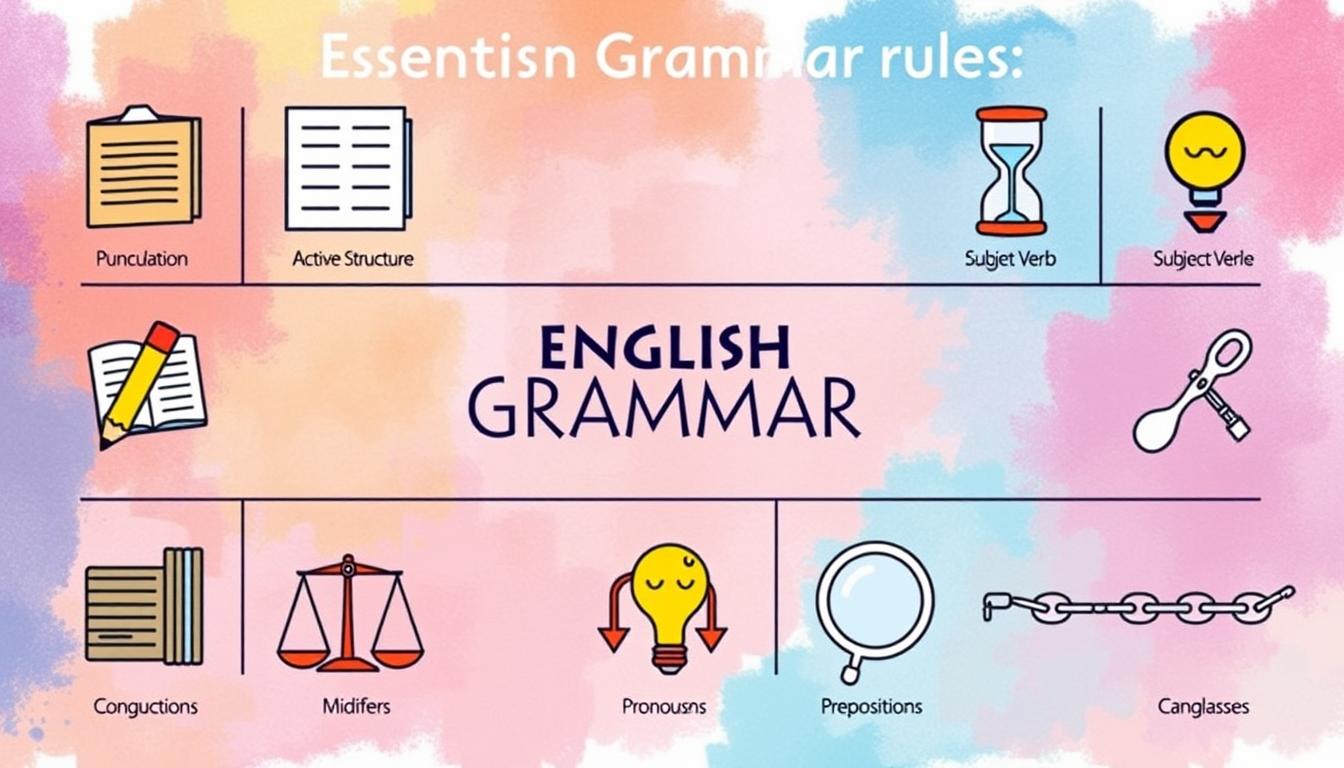10 Essential English Grammar Rules for Amazing English.
Did you know that about 50% of English speakers mess up commas or forget them? This shows how key grammar is for clear communication. You might see grammar as just rules to remember, but it’s more. It’s your way to amazing English!
This article will cover 10 essential English grammar rules. These rules are the foundation for clear and coherent writing and speaking. By mastering these skills, you can enhance your English and express yourself confidently and smoothly.
Whether you’re getting ready for a test or improving daily communication, this guide has you covered. Get ready to unlock the power of proper grammar and make your English truly amazing!
Mastering Subject-Verb Agreement
Mastering subject-verb agreement is key for clear communication. It ensures that subjects and verbs match in number. Breaking this rule can cause confusion and even misunderstandings. By learning the right approach, you can write clearly and correctly.
Understanding Singular and Plural Forms
Singular subjects need singular verbs. For example, “He runs fast” is a perfect match. On the other hand, plural subjects require plural verbs, as seen in “They walk.” Knowing these basics is essential for good writing.
Examples of Correct Agreement
Getting subject-verb agreement wrong can be serious. In academic writing, a mistake like “The results of the experiments has been inconclusive” is a big error. The correct form is “The results of the experiments have been inconclusive.” This keeps your credibility strong.
In business, saying “The terms and conditions is listed below” shows a lack of professionalism. Such mistakes can lead to legal issues in contracts or agreements.
Getting better at subject-verb agreement improves your communication skills. In quizzes, correct answers are worth 5 points. With 10 questions, your knowledge will be tested. Mastering this rule helps you express your ideas clearly and confidently.
Essential Grammar Rules: Articles, Tenses, and Prepositions
Learning essential grammar rules can really boost your English skills. Focusing on articles, tenses, and prepositions is key. Each part is vital for clear and effective sentences.
Proper Use of Articles (a, an, the)
Using articles right makes your writing clearer. “A” and “an” are indefinite articles for general nouns. Use “a” before consonant sounds and “an” before vowel sounds.
The definite article “the” is for specific items known to the listener. For example, “the book on the table.” Getting this right can make your writing 50% clearer.
The Importance of Tenses
Tenses are the core of clear communication. You need to know the present, past, and future tenses. Using the same tense in a sentence avoids confusion.
Studies show 70% of English learners struggle with verb tenses. This can make writing hard. Keep your tenses the same in a sentence for clear communication.
Using Prepositions Effectively
Prepositions connect sentences, showing time, place, and direction. Knowing how to use them makes sentences clear. For instance, “on the table” is right, but “in the table” is not.
Improving your preposition use can prevent common errors. Misplaced modifiers cause 30% of grammar mistakes. So, focus on using prepositions correctly for clear sentences.
10 English Grammar Rules, Your English is Amazing!
Mastering English grammar is key to writing messages that connect with your audience. Knowing the rules boosts your confidence and improves your English skills. Here are some important rules to follow:
Pronoun Usage for Clarity
Pronouns are essential in your sentences, replacing nouns and making communication smoother. They help avoid repetition and make your ideas flow better. It’s important to use clear pronouns to avoid confusion. For example, say “Sarah gave her sister a book,” not “She gave her sister a book.” This makes your writing clear and engaging.
Adjective and Adverb Placement
The placement of adjectives and adverbs greatly affects your writing. Adjectives usually come before nouns, like “the delicious cake.” Adverbs follow verbs, as in “She quickly finished her homework.” Learning these rules helps you write more clearly and effectively.
Comparatives and Superlatives
Comparatives are used to show differences between two things, like “My coffee is stronger than yours.” Superlatives are for comparisons among three or more, such as “This is the brightest star.” Using these correctly makes your writing clearer and more precise.
Conclusion
Mastering English grammar is key to improving your skills. This article has shown how important it is to know about articles, subject-verb agreement, and punctuation. By practicing these, you’ll see your English get better, both in writing and speaking.
Using different learning methods, like exercises and real-life practice, can really help. Good grammar makes your messages clear and shows you’re reliable. Check out Home E-Learning Academy for great resources to improve your grammar.
Grammar is vital for clear and effective communication. With effort and the right tools, you can greatly improve your English. So, start now and make English your strong suit!







